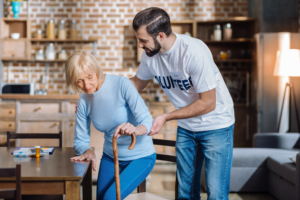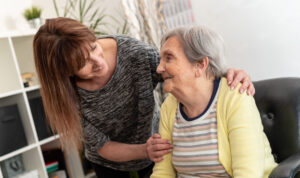Caregiving is a labor of love, but it can also take a significant toll on your physical and emotional health. As our loved one’s age, they often require extra care to maintain their quality of life. When it comes to caring for aging parents, it can be incredibly rewarding, but it is not without challenges, especially when you factor in all the physical and emotional tolls that come with it. You may find yourself feeling exhausted, stressed out, and anxious about what the future holds for your loved one. If you are taking care of an elderly loved one, it is crucial to recognize the physical and emotional toll that caregiving can take and take steps to care for yourself. These feelings are normal, but it is also essential to take care of your mental health and physical needs, or you may risk burnout. In this blog post, we will discuss the physical and emotional toll of caregiving and share some tips and strategies to help you care for your mental health and give you some practical self-care tips.

Physical Toll
The physical demands of caregiving can be extensive. If your loved one requires assistance with mobility, bathing, toileting, dressing, or feeding, you may find yourself lifting, pulling, pushing, and bending in uncomfortable ways. If you are not in good physical shape, the physical demands of caregiving can be especially challenging and lead to injury, such as back pain or muscle strain. Additionally, caregiving can be exhausting, and sleep deprivation is a common occurrence. If you do not take steps to care for your physical health, you may experience burnout and take longer to recover when you get sick.
Additionally, caregivers may need to lift or transfer their loved ones, which can lead to back pain and injury. According to the National Alliance for Caregiving, 17% of caregivers reported that caregiving worsened their own health. In the hospital we see it all the time where the caregiver is ill and now no one is able to care for their loved one that is now home alone because the main caregiver is in the hospital. It is essential to have back up plans and alternative caregivers lined up so you can have a break and get some “me” time. We teach our clients to use the “Share the Care Model” to put together a team of volunteer caregivers to offer breaks for the main caregivers. Even if they are not wanting to provide “hands-on” cares there are plenty of things others can do that would be helpful and take some of the load off of you.
Emotional Toll
The emotional toll of caring for an aging loved one can be just as taxing as the physical toll. Watching a loved one decline can be heartbreaking and emotionally draining. Caregivers often experience a range of emotions such as grief, anger, and frustration. They may feel guilty if they cannot provide the level of care they think their loved one deserves, or they may feel like they have lost their own identity outside of being a caregiver. Seeing your loved one suffer from illness, aging, or disability can be heart-wrenching. You may feel overwhelmed by the responsibility of caring for them, guilty about not being able to do more, or resentful about sacrificing your own needs and wants. You may also experience stress, anxiety, depression, or anger. If you do not address your emotional well-being, you may develop caregiver burnout, a state of physical, emotional, and mental exhaustion.
Again, according to the Family Caregiver Alliance, caregivers often neglect their own health and well-being. This neglect can lead to health problems, including hypertension, chronic fatigue, headaches, and increased risk of infection. To care for yourself physically, try to get adequate sleep, eat a healthy diet, and exercise regularly, even if it’s just a few minutes of stretching every day.
Linda, my partner and the second “Your Nurse Advocate” is going through a very emotional time with her aging mom. She is 91 and her health is declining. All the challenges are occurring with her. She tells Linda, “I don’t need any help.” I don’t want other people in my house.” “Why can’t you just take care of me.” Linda lives an hour away from her parents and lately she has been going to their house every day and once on the weekend and trying to run a business. She has finally gotten her mom to accept hospice after turning them away during 3 different in-home informational meetings. This has been a huge help but often does not stop the 7-8 phone calls per day.
Linda is the oldest of 6 kids and has 2 sisters that each live on opposite coasts. One local sister does not agree with the treatment plan or hospice so there is a lot of tension in the family. Sometimes a third party can help to mediate family disagreements and a nurse advocate would be a great resource in this situation.

By wavebreak3 Adobe Stock Photos
Self-Care Strategies
It’s essential for caregivers to care for themselves as well as their loved ones. Here are some strategies that can help caregivers maintain their physical and emotional well-being:
1. Prioritize your own health – Taking care of your own physical and emotional health is just as important as caring for your loved one. Make sure you’re eating well, exercising, and getting enough sleep. It is essential to have strategies in place to care for your mental health as a caregiver. First, identify your triggers and stressors so that you can better avoid or cope with them. Second, set boundaries and learn to say “no” when you need to. Third, stay organized and prioritize tasks, avoiding the guilt of not completing them all. Additionally, remember to schedule breaks and time for yourself, even if it’s just 30 minutes a day for a walk or other activity.
2. Find support – Reach out to friends, family, or a support group to help you manage the emotional toll of caregiving. It’s important to have a support system in place to help you through tough times. Hire outside help: Consider hiring outside assistance, such as a home health care provider. This can alleviate your workload and provide the necessary care that your loved one needs while also giving you a break. A nurse or patient advocate can help you weed through this process and coordinate plans with your doctor to make this a smooth transition to get you some needed help.
Accept help: Allow others to help you. Accept offers for assistance from your family and friends, whether it is cooking a meal or running an errand.
3. Take breaks – Take time for yourself to relax and recharge. This can help prevent burnout and help you be a better caregiver in the long run. Make time for activities that bring you joy, such as reading, exercising, or spending time with friends. Find ways to incorporate self-care into your daily routine. For example, take a walk around the block, soak in a hot bath, or practice meditation. Self-care is vital to prevent caregiver burnout. Consider taking time for yourself to do things you enjoy, such as reading, practicing a hobby, or taking a warm bath. You may also find relaxation techniques like yoga, tai chi, or deep breathing helpful. It can also be helpful to delegate tasks and responsibilities, such as hiring a cleaning or home health aide. Whether it’s an in-home health aide or housekeeper, hiring someone to take the burden off of you can make a world of difference.

4. Set boundaries – It’s important to set boundaries and let others know when you need help. Some caregivers feel like they need to do it all, but it’s okay to ask for help and delegate tasks. This is a huge step. Linda has had to set several boundaries in order to preserve her mental health. Sometimes, check-in calls can help to avoid unnecessary phone calls due to your aging loved one feeling scared or alone. Calling them during a convenient time for you may offset getting a call and being interrupted when it is not an opportune time. Set specific times for grocery shopping, errands, etc. and stick to those. You need to assure them that you love them and want to help but you have to take care of your things as well so sticking to a schedule again will give you some control back on how you are spending your time helping them. Think of being more “proactive” planning ahead, vs. being “reactive” and flying by the seat of your pants being at their beckon call!
5. Seek professional help – If you’re feeling overwhelmed or experiencing symptoms of depression or anxiety, seek professional help. A therapist or counselor can help you manage the emotional toll of caregiving. Sometimes this is necessary and does not mean you are weak or a failure. Sometimes you just need that unbiased professional support that is their just for you to get you over the rough spots. Better to get the support you need vs always being angry and upset with your aging loved ones. These are not the best memories you will want to hold on to after they are gone.
Conclusion:
Caring for an aging loved one can be one of the most challenging experiences of your life. It’s essential to acknowledge the physical and emotional toll that caregiving can take on you, and to prioritize your own mental and physical health needs. Remember that self-care is not selfish; it’s necessary for your wellbeing and the quality of care you’re able to provide to your loved one. Take advantage of community resources, and don’t hesitate to ask for help when you need it. You don’t have to do this alone. Take advantage of resources including reaching out to a patient or nurse advocate that can come along side you and assist in working with your healthcare team to avoid the pitfalls of caring for an aging parent.
Thanks for stopping by and spending a few of your precious minutes with us. Our goal is to bring you value with educations, tips and strategies to make this journey of caregiving a bit easier.
Take care and see you back here soon,
Pam and Linda,
Your Nurse Advocates
“Compassionate care for aging parents, peace of mind for adult children.”
Resources:
https://www.nia.nih.gov/health/taking-care-yourself-tips-caregivers
https://www.nia.nih.gov/health/what-respite-care
Free Course: Understanding the ABCs and Terminology of Senior Care
Online Course: When is it time to step in and assist your aging parents?
Free Private Forum: Speaking Out on the Care of Your Aging Parents






